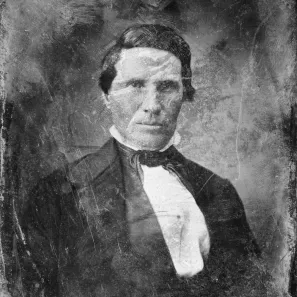The name Alexander Doniphan isn’t well known to the average New Mexican. I don’t remember hearing it when I took New Mexico history in fifth grade, nor do I remember it during New Mexico history at University. Nobody really speaks of him today.
Nevertheless, we largely owe to Colonel Doniphan the foundation of most New Mexican law, not because he was a genius, but because he was in the right place at the right time.
When President Polk ordered General Stephen Kearny to conquer the West, after New Mexico was conquered, Colonel Doniphan was left in charge of conquering the southern part of New Mexico. He accomplished the mission, commanding the US Army in the Battle of Brazito on Christmas Day of 1845.
He also ended up writing a new set of laws for New Mexico, which came to be known as the Kearny Code. The Kearny Code was largely based on Missouri law because Colonel Doniphan, and his assistant Willard Prebel Hall, were from Missouri, as were a bunch of soldiers in the Army of the West. Hall happened to have a copy of the Missouri set of laws in his saddlebags and the rest is history.

Formative Years
When Doniphan was five years old, his father died and he was sent to live with his older brother, George, in Kentucky. He graduated college, studied law, and set out west, which was Missouri at the time, in search of fame or fortune. After being admitted to the bar in 1830, he became a prominent defense attorney (unsuccessfully defended the Mormons from expulsion), a local politician, and may have joined a local militia.
In 1838, the people of Missouri began to persecute the Mormons and the Governor called for the State Militia to intervene. Joseph Smith, the leader of the Mormons, was found guilty of treason in a Court Martial. Doniphan, who at the time was a Brigadier General in the state militia, refused to execute the Mormons as ordered, believing that the Court Martial was illegal as the Mormons were not part of the military.
“It is cold-blooded murder. I will not obey your order. My brigade shall march for Liberty tomorrow morning, at 8 o’clock; and if you execute these men, I will hold you responsible before an earthly tribunal, so help me God.”
Colonel Doniphan wrote to General Samuel Lucan upon the order of executions of the Mormons
The War of the United States Against Mexico
In 1846, the United States declared war on Mexico after a skirmish on what was arguably Mexican soil. In any event, the United States found itself needing soldiers to take over the West, and Colonel Doniphan heeded the call. He was placed in command of the First Missouri Mounted Volunteers. In June of 1848, Doniphan and his men accompanied his men to New Mexico, along with about 1,700 other soldiers as part of Kearny’s Army of the West. on August 9, 1846, General Armijo surrendered without much of a fight and General Kearny left Doniphan in charge of New Mexico in late 1846.
Doniphan eventually made his way to Southern New Mexico and went on to win the Battle of Brazito, near what is now Canutillo, TX, and the Battle of the Sacramento River, which allowed for the capture of Chihuahua, MX, after which his troops met up with then General Zachary Taylor at Buena Vista, MX. In all, he and his men marched some 5,500 miles throughout North America.
Kearny Code
The Kearny Code was the first set of laws of the territory of New Mexico after it became owned by the United States. Promulgated by General Stephen Kearny on September 22, 1846, the hastily created set of laws Coahuila y Tejas and the Livingston Code. There were obviously previous sets of laws under the Native Americans, Spanish, and Mexicans. The Kearny Code was submitted to Congress along with the Organic Act, which created the Territory of New Mexico. Many provisions of the code remain valid today. Interestingly, partly because Colonel Doniphan was a slaveholder himself prior to the Civil War but possibly contradictory to Missouri Code, the Code did not distinguish between Citizens and Non-Citizens, but granted rights to All Persons. The laws were mostly verbatim from a copy of the Missouri statutes that Private Willard Preble Hall, another Missouri attorney, had in his saddlebags.
Postwar Years
Doniphan returned to Missouri and opened a law practice, established the Ray County Savings Bank, and died on August 8, 1887, in Richmond, Missouri. There is a life-sized statue of Doniphan outside of the Ray County Courthouse in Richmond, Missouri.


